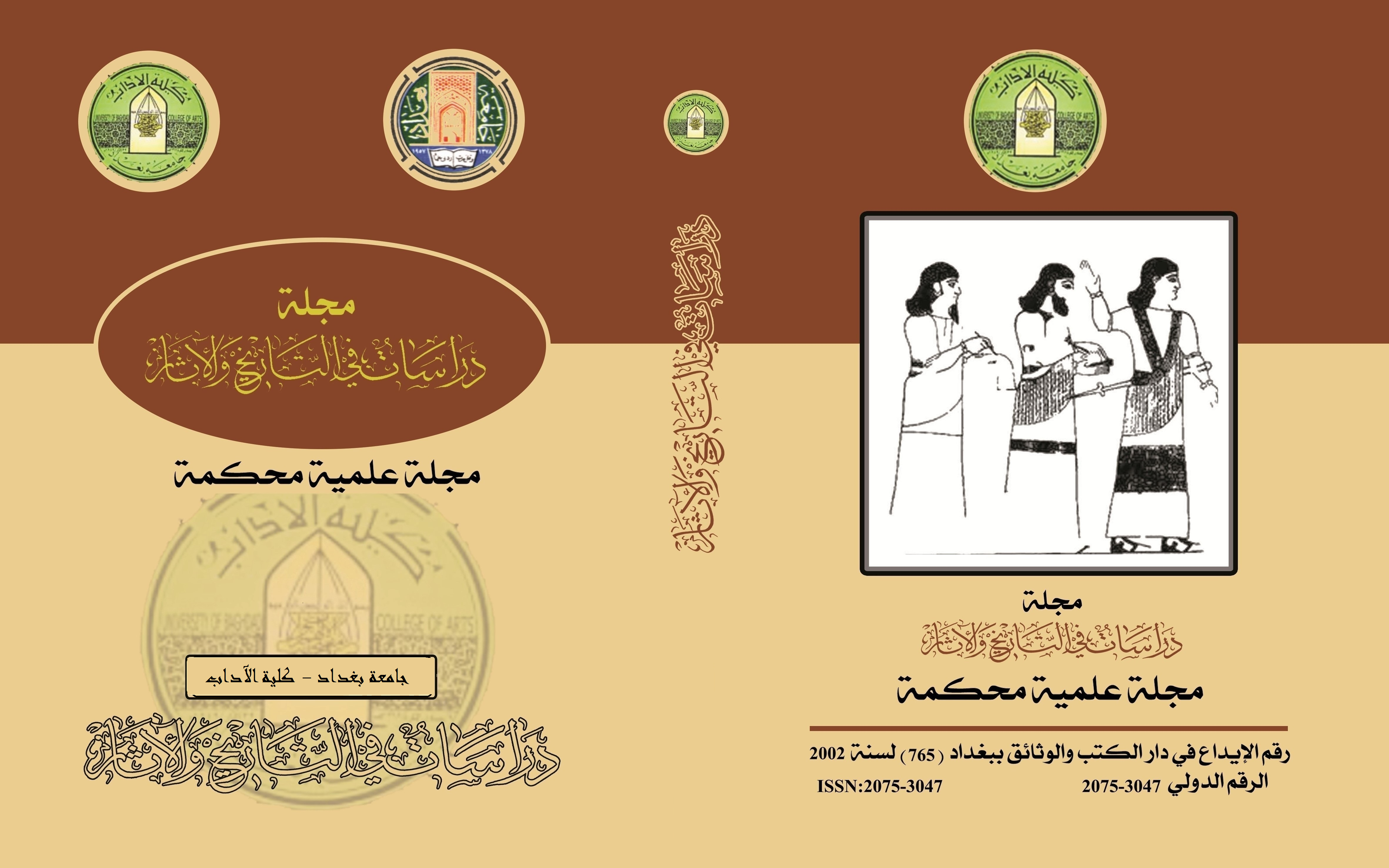حرية الرأي في العصر النبوي
الكلمات المفتاحية:
سنة، حرية، رأي، فكر، منهجالملخص
كفل الشارع الحكيم حرية الأفراد العقدية والسياسية والمدنية، وكفل لهم حرية الرأي والتعبير، التي تعد من أهم قضاء الفكر الإنساني ومن أهم عوامل البناء الحضاري ، وباستعمال هذه الحرية بشكل صحيح تتم الإفادة من الآراء والخبرات في مسيرة بناء وضوابط وشروط تضمن لكل فرد او مجتمع ، ويمنع التسلط والاستبداد والفساد الذي يعيق ذلك. والإسلام وضع لذلك حدودا حقه في التعبير عن رأيه من غير اعتداء على الآخرين، وهذا البحث لبيان هذه المسألة من منظور السنة النبوية ،وذلك من خلال التعريف بحرية الرأي ومعناها، وتفصيل الضوابط والقيود التي يجب مراعاتها لمن يريد النقد أو إبداء الرأي، المتمثلة في خلوه من التعصب والتقليد، وعدم معارضته للنصوص الشرعية أو مخالفته للآداب العامة، وإيراد النماذج التطبيقية على حرية الرأي في عهد النبي صلى الله عليه واله وسلم واصحابه ومواقفهم السياسية والاجتماعية
المراجع
ابن الاثير . (1910). اسد الغابة في معرفة الصحابة . طهران : المطبعة البهية اوفسيت المطبعة الاسلامية .
- ابن الاثير. (1965). الكامل في التاريخ. (تحقيق نخبة من العلماء، المترجمون) بيروت: دار الكتب العلمية ، ج2.
- ابن الجوزي. (د.ت). سيرة عمر بن الخطاب. مصر: الدار القومية.
- ابن العربي . (1957). احكام القران. بيروت: دار احياء الكتاب العربي .
- العلي ( 1983) الحريات العامة في الفكر والنظام السياسي في الإسلام ، دار الفكر عمان
- ابن حنبل. (1949). المستد. مصر: دار المعارف .
- ابن خلدون . (1988). المقدمة. بيروت : دار مكتبة الهلال .
- ابن سيد الناس. (1974). عيون الاثر في فنون المغازي والشمائل والسير . بيروت : دار الطليعة ، ج3.
- ابن كثير . (1938). تفسير القرآن العظيم. مصر: دار احياء الكتب العربية عيسى البابي الحلبي.
- ابن ماجه. (1953). سنن ابن ماجه . مصر : دار احياء الكتاب العربي .
- ابن هشام . (1988). السيرة النبوية. عمان: مكتبة المنار.
- ابو حيان. (1930). البحر المحيط. مصر: مطبعة السعادة.
- ابو زيد شلبي. (1964). تاريخ الحضارة الاسلامية والفكر الاسلامي . القاهرة : مطبعة وهبة .
- احمد مطلوب. (1988). الدولة في عهد الرسول (). بغداد: مجلة المجمع العلمي العراقي ، المجلد التاسع والثلاثون ، العدد 3.
- ال عمران . (الاية 106).
- ال عمران. (الاية 159).
- الانعام. (الاية 152).
- الانفال. (الاية 460).
- البخاري. (د.ت ). صحيح البخاري. مصر : دار احياء الكتب العربية .
- البيهقي. (1969). السنن الكبرى. الهند: مجلس المعارف العثمانية حيدر اباد.
- التوبة. (الاية 4).
- الجصاص. (1959). احكام القران . مصر : المطبعة البهية .
- الرازي. (1981). مختار الصحاح . بيروت : دار الكتاب العربي .
- السهيلي. (1972). الروض الانف. القاهرة : مكتبة الكلية الازهرية ، ج2.
- الشهرستاني. (د.ت). الملل والنحل. تحقيق : عبد العزيز محمد الوكيل، بيروت: دار الفكر للطباعة والنشر.
- الشورى. (الاية 38).
- الطبري. (1960). تاريخ الرسل والملوك . مصر : دار المعارف .
- العنكبوت. (الاية 69).
- القرطبي. (1958). الجامع لاحكام القران. القاهرة: دار الكتاب العربي للطباعة والنشر.
- القيم ابن الجوزي. (1960). زاد المعاد في هدى خير العباد. القاهرة: المطبعة المصرية ، ج3.
- المائدة. (الاية 30).
- المسعودي. (1989). مروج الذهب ومعادن الجوهر. تحقيق قاسم الدفاعي، بيروت: دار العلم.
- النجم. (الايات 3-4).
- النحل. (آية 125).
- النساء. (الاية 58).
- النمل. (الاية 91).
- اليعقوبي. (1960). تاريخ اليعقوبي. بيروت: دار صادر.
- حسن ابراهيم حسن. (1964). تاريح الاسلام السياسي والديني والثقافي والاجتماعي من (41/132هـ). القاهرة : مكتبة النهضة المصرية .
- صالح احمد العلي . (1969). تنظيمات الرسول الادارية في المدينة. بغداد: مجلة المجمع العلمي العراقي.
- صلاح الدين الناهي . (1968). النظرية العامة في القانون الموازن وعلم الخلاف . بغداد : د. ن.
- ابن كثير. (1977). البداية والنهاية. بيروت: مطبعة المعارف.
- ابن كثير. (1987). تفسير القران الكريم. تحقيق : مصطفى عبد الواحد، بيروت: دار الرائد العربي ، ج1.
- محمد حميد. (1966). مجموعة الوثائق السياسية للعهد النبوي والخلافة الراشدة . بيروت: دار الفكر .
Sources and references
- Ibn Al-Atheer. (1910). The Lion of the Jungle in the Knowledge of the Companions. Tehran: Al-Bahiyah Offset Press, Islamic Press.
- Ibn Al-Atheer. (1965). Complete in history. (Verified by a group of scholars, translators) Beirut: Dar Al-Kutub Al-Ilmiyya, vol. 2.
- Ibn al-Jawzi. (d.t.). Biography of Omar bin Al-Khattab. Egypt: National House.
- Ibn al-Arabi. (1957). Provisions of the Qur’an. Beirut: Arab Book Revival House.
- Ibn Hanbal. (1949). Almstad. Egypt: Dar Al-Maaref.
- Ibn Khaldun. (1988). the introduction -. Beirut: Al-Hilal Library House.
- Ibn Sayyid al-Nas. (1974). Oyoun al-Athar in the Arts of Maghazi, Shama’il and Sir. Beirut: Dar Al-Tali’ah, Part 3.
- Ibn Kathir. (1938). Interpretation of the Great Qur’an. Egypt: House of the Revival of Arabic Books, Issa Al-Babi Al-Halabi.
- Ibn Majah. (1953). Sunan Ibn Majah. Egypt: Arab Book Revival House.
- Ibn Hisham. (1988). Biography of the Prophet. Amman: Al-Manar Library.
- Abu Hayyan. (1930). ocean sea. Egypt: Al-Saada Press.
- Abu Zaid Shalabi. (1964). History of Islamic civilization and Islamic thought. Cairo: Wahba Press.
- Ahmed is wanted. (1988). The state during the era of the Prophet (PBUH). Baghdad: Journal of the Iraqi Scientific Academy, Volume Thirty-Nine, Issue 3.
- Al Imran. (verse 106).
- Al Imran. (verse 159).
- Al-An’am. (verse 152).
- Anfal. (verse 460).
- Al-Bukhari. (d.t.) Sahih Bukhari. Egypt: Arab Book Revival House.
- Al-Bayhaqi. (1969). The great Sunnah. India: Ottoman Encyclopedia Hyderabad.
- Repentance. (verse 4).
- Al-Jasas. (1959). Provisions of the Qur’an. Egypt: Al-Bahia Press.
- Al-Razi. (1981). Mukhtar Al-Sahah. Beirut: Arab Book House.
- Al-Suhaili. (1972). Al-Rawd Al-Naf. Cairo: Al-Azhar College Library, vol. 2.
- Al-Shahristani. (d.t.). Boredom and bees. Verified by: Abdul Aziz Muhammad Al-Wakil, Beirut: Dar Al-Fikr for Printing and Publishing.
- Shura. (verse 38).
- Al-Tabari. (1960). The history of the apostles and kings. Egypt: Dar Al-Maaref.
- Spider. (verse 69).
- Al-Qurtubi. (1958). The comprehensive of the provisions of the Qur’an. Cairo: Dar Al-Kitab Al-Arabi for Printing and Publishing.
- Al-Qayyim Ibn Al-Jawzi. (1960). The Day of Resurrection increased in the guidance of the best of servants. Cairo: Egyptian Press, vol. 3.
- Al-Ma’idah. (verse 30).
- Al-Masoudi. (1989). Meadows of gold and precious metals. Verified by Qasim Al-Diffai, Beirut: Dar Al-Ilm.
- The star. (Verses 3-4).
- Bees. (verse 125).
- Women. (verse 58).
- Ants. (verse 91).
- Al-Yaqoubi. (1960). History of Yaqubi. Beirut: Dar Sader.
- Hassan Ibrahim Hassan. (1964). History of political, religious, cultural and social Islam from (41/132 AH). Cairo: Egyptian Nahda Library.
- Saleh Ahmed Al-Ali. (1969). Al-Rasul’s administrative organizations in the city. Baghdad: Journal of the Iraqi Scientific Academy.
- Salah al-Din al-Nahi. (1968). The general theory of balanced law and the science of disagreement. Baghdad: Dr. n.
- Ibn Kathir. (1977). The beginning and the end. Beirut: Al-Maaref Press.
- Ibn Kathir. (1987). Interpretation of the Koran. Mustafa Abdel Wahed, Beirut: Dar Al-Raed Al-Arabi, vol. 1.
- Muhammad Hamid. (1966). A collection of political documents of the Prophet’s era and the Rightly Guided Caliphate. Beirut: Dar Al-Fikr.
منشور
إصدار
القسم
الرخصة

هذا العمل مرخص بموجب Creative Commons Attribution 4.0 International License.
:حقوق الطبع والنشر والترخيص
بالنسبة لجميع البحوث المنشورة في مجلة دراسات في التاريخ والآثار، يحتفظ الباحثون بحقوق النشر. يتم ترخيص البحوث بموجب ترخيص Creative Commons CC BY 4.0 المفتوح ، مما يعني أنه يجوز لأي شخص تنزيل البحث وقراءته مجانًا. بالإضافة إلى ذلك ، يجوز إعادة استخدام البحث واقتباسه شريطة أن يتم الاستشهاد المصدر المنشور الأصلي. تتيح هذه الشروط الاستخدام الأقصى لعمل الباحث وعرضه.
:إعادة إنتاج البحوث المنشورة من الناشرين الآخرين
من الضروري للغاية أن يحصل الباحثون على إذن لإعادة إنتاج أي بحث منشورة (أشكال أو مخططات أو جداول أو أي مقتطفات من نص) لا يدخل في نطاق الملكية العامة أو لا يملكون حقوق نشرها. يجب أن يطلب الباحثون إذنًا من مؤلف حقوق النشر (عادة ما يكون الناشر).
يطلب الإذن في الحالات التالية:
بحوثك الخاصة المنشورة من قِبل ناشرين آخرين ولم تحتفظ بحقوق النشر الخاصة بها.
مقتطفات كبيرة من بحوث أي شخص أو سلسلة من البحوث المنشورة.
استخدم الجداول والرسوم البيانية والمخططات والمخططات والأعمال الفنية إذا لم يتم التعديل عليها.
الصور الفوتوغرافية التي لا تملك حقوق لنشرها.
لا يطلب الإذن في الحالات التالية:
إعادة بناء الجدول الخاص بك مع البيانات المنشورة بالفعل في مكان آخر. يرجى ملاحظة أنه في هذه الحالة يجب عليك ذكر مصدر البيانات في شكل "بيانات من ..." أو "مقتبس من ...".
تعتبر عروض الأسعار القصيرة معقولة الاستخدام العادل ، وبالتالي لا تتطلب إذنًا.
الرسوم البيانية ، الرسوم البيانية ، المخططات ، الأعمال الفنية التي أعاد الباحث رسمها بالكامل والتي تم تغييرها بشكل ملحوظ إلى درجة لا تتطلب الاعتراف.
الحصول على إذن
لتجنب التأخير غير الضروري في عملية النشر ، يجب أن تبدأ في الحصول على أذونات في أقرب وقت ممكن. لا يمكن لمجلة الآداب نشر بحث مقتبس من منشورات أخرى دون إذن.
قد يمنحك مالك حقوق الطبع والنشر تعليمات بشأن شكل الإقرار الواجب اتباعه لتوثيق عمله ؛ بخلاف ذلك ، اتبع النمط: "مستنسخ بإذن من [المؤلف] ، [كتاب / المجلة] ؛ نشره [الناشر] ، [السنة]." في نهاية شرح الجدول ، الشكل أو المخطط.



















